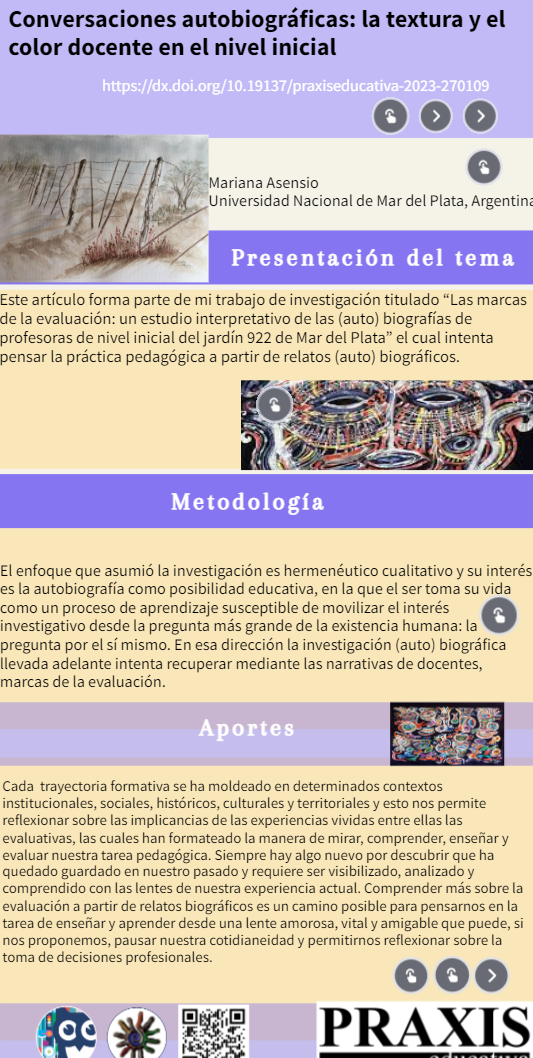Autobiographical conversations: teaching texture and color at the initial level
DOI:
https://doi.org/10.19137/praxiseducativa-2023-270109Keywords:
marks, identity, evaluationAbstract
This article is part of my research work entitled "The marks of evaluation: an interpretive study of the (auto) biographies of teachers of initial level of the Kindergarten 922 of Mar del Plata" which tries to think the pedagogical practice from (auto) biographical stories. In this research, the voices of teachers, interviewed during the fieldwork, are intertwined with my own professional experiences, creating a text in which the concepts of autobiography, identity and evaluation are combined and intertwined. This recreates multiple stories that make visible the task of teaching and learning. Moreover, they allow delving into vital experiences that make up the subjectivity and structuring of the teaching identity.
Downloads
References
Abramowski, A (2010). Maneras de querer. Los afectos docentes en las relaciones pedagógicas. Paidós.
Alliaud y Duschatzky (Comps.). (1992). Maestros. Formación práctica y transformación escolar. Miño y Dávila.
Anijovich, Cappelletti, Mora y Sabelli. (2014). Transitar la formación pedagógica. Dispositivos y estrategias. Editorial Paidós.
Arfuch, L. (2002). Problemáticas de la Identidad. En L. Arfuch (Comp.), Identidades, sujetos y subjetividades. Prometeo Libros.
Birgin, A. y Charovsky, M. (2013). Trayectorias de formación de futuros profesores en un territorio fragmentado. Universidad Pedagógica Nacional Facultad de Educación.
Canelo Calle, J. (2020). La construcción de la identidad docente a través del análisis de incidentes críticos en la formación inicial de maestros [Tesis doctoral]. Facultad de Psicología, de Ciencias de la Educación y del Deporte-Blanquerna. Universitat Ramón Llull. http://hdl.handle.net/10803/669964
Ferry, G. (1991). El trayecto de la formación. Los enseñantes entre la teoría y la práctica. Editorial Paidós.
Ferry, G. (1997). Pedagogía de la formación. Facultad de Filosofía y Letras UBA Ediciones.
Furlan, A. y Ochoa Reyes, N. E. (2018). En C. Kaplan, Emociones, sentimientos y afectos. Las marcas subjetivas de la educación (pp. 15-26). Editorial Miño y Dávila.
Grimson, A. (2011). Los límites de la cultura. Crítica de las teorías de la identidad. Siglo XXI Editores.
Larrosa, J. (2002). Experiencia y pasión. En Entre las lenguas. Lenguaje y educación después de Babel (pp. 165-178).
Litwin, E. (2013). El oficio de enseñar. Condiciones y contextos. Paidós.
Maturana, H. (1991). El sentido de lo humano. Ediciones Pedagógicas Chilenas.
Meijer, P., Beijaard, D. y Verloop, N. (2004). Examinar las cogniciones interactivas de los docentes utilizando los conocimientos de la investigación sobre el conocimiento práctico de los docentes. En Formación de docentes y práctica docente (pp. 186-202). Routledge.
Minuchin, P. (1985). Familias y desarrollo individual: Provocaciones desde el campo de la terapia familiar. Desarrollo infantil, 289-302.
Mercado, R. (2004). La experiencia estudiantil universitaria de jóvenes migrantes campesinos en la Universidad Nacional de Córdoba. Facultad de Filosofía y Humanidades. Doctorado en Ciencias de la Educación Universidad Nacional de Córdoba.
Valliant, D. (septiembre de 2007). La identidad docente. Congreso Internacional “Nuevas Tendencias en la Formación Permanente del Profesorado”, GTD-PREAL ORT. Barcelona. http://www.scribd.com/doc/2030599/La- identidaddocente.
Villavicencio Miranda, L. (2010). La relevancia moral de la identidad cultural. Polis. Revista Latinoamericana, (26).
Vizcaíno, A. (2008). El aprendizaje de la práctica docente. Ingreso a la docencia: entre mimetizarse, parecerse, diferenciarse. Editorial Paidós.

Published
Issue
Section
License
Copyright Notice
Editorial Committee Educational Praxis Magazine:
I hereby declare that I am the author of the article titled (article name), that it is original and my own and that it was not previously published in any other format or medium. I declare to know that the magazine will not charge me any type of fee under any circumstances, nor will I receive any type of monetary compensation If it were accepted for publication in Educational Praxis, I authorize the aforementioned magazine to publish it digitally and to advertise it on its social networks.
If the work is published, I adhere to the Creative Commons license called "Attribution - Non-Commercial Share Alike CC BY-NC-SA", through which it is allowed to copy, reproduce, distribute, publicly communicate the work and generate derivative works, as long as when the original author is cited and acknowledged. This license has been used since September 2018. In 2016 CC BY NC ND 4.0 was adhered to; and in the years 2017 and 2018 (January-August) CC BY NC 4.0.
This CC BY-NC-SA Share Alike license does not, however, permit commercial use of the work. As an author, the journal may establish additional agreements for the non-exclusive distribution of the version of the work published in the journal, it allows me to self-archive the published articles, in their post-print version, in institutional, thematic repositories, personal web pages or any other relevant use. with the recognition of having been first published in this journal.
Educational Praxis adheres to DORA (Declaration on Research Assessment) signed in San Francisco, California, on December 16, 2012, and to the Declaration of Mexico (Joint Declaration LATINDEX - REDALYC - CLACSO - IBICT).














_(1)2.png)


3.png)











_(2).png)






2.jpg)









